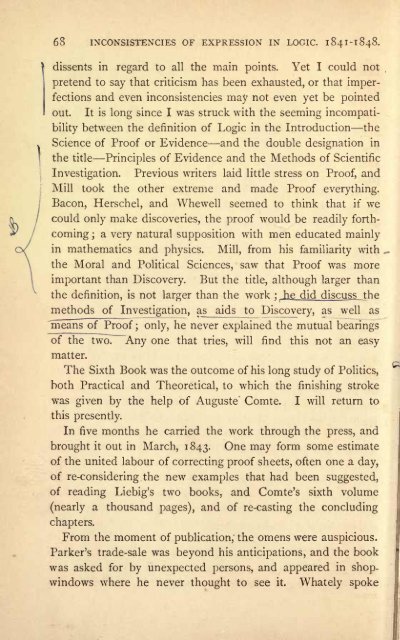John Stuart Mill: A Criticism with Personal Recollections
John Stuart Mill: A Criticism with Personal Recollections
John Stuart Mill: A Criticism with Personal Recollections
Create successful ePaper yourself
Turn your PDF publications into a flip-book with our unique Google optimized e-Paper software.
68 INCONSISTENCIES OF EXPRESSION IN LOGIC. 1841-1848.<br />
dissents in regard to all the main points. Yet I could not<br />
pretend to say that criticism has been exhausted, or that imper<br />
fections and even inconsistencies may not even yet be pointed<br />
out. It is long since I was struck <strong>with</strong> the seeming incompati<br />
bility between the definition of Logic in the Introduction the<br />
Science of Proof or Evidence and the double designation in<br />
the title Principles of Evidence and the Methods of Scientific<br />
Investigation. Previous writers laid little stress on Proof, and<br />
<strong>Mill</strong> took the other extreme and made Proof everything.<br />
Bacon, Herschel, and Whewell seemed to think that if we<br />
could only make discoveries, the proof would be readily forth<br />
coming ; a very natural supposition <strong>with</strong> men educated mainly<br />
in mathematics and physics. <strong>Mill</strong>, from his familiarity <strong>with</strong><br />
the Moral and Political Sciences, saw that Proof was more<br />
important than Discovery. But the title, although larger than<br />
{<br />
the definition, is not larger than the work ; he did discuss the<br />
methods of Investigation, as^ aids to Discovery, as well as<br />
means of Proof; only, he never explained the mutual bearings<br />
of the two. Any one that tries, will find this not an matter.<br />
easy<br />
The Sixth Book was the outcome of his long study of Politics,<br />
both Practical and Theoretical, to which the finishing stroke<br />
was given by the help of Auguste Comte. I will return to<br />
this presently.<br />
In five months he carried the work through the press, and<br />
brought it out in March, 1843. One ma y form some estimate<br />
of the united labour of correcting proof sheets, often one a day,<br />
of re-considering the new examples that had been suggested,<br />
of reading Liebig s two books, and Comte s sixth volume<br />
(nearly a thousand pages), and of re-casting the concluding<br />
chapters.<br />
From the moment of publication, the omens were auspicious.<br />
Parker s trade-sale was beyond his anticipations, and the book<br />
was asked for by unexpected persons, and appeared in shopwindows<br />
where he never thought to see it. Whately spoke

















